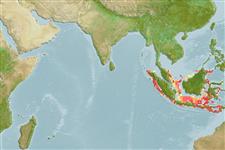Actinopterygii (ray-finned fishes) >
Perciformes (Perch-likes) >
Nemipteridae (Threadfin breams, Whiptail breams)
Etymology: Nemipterus: Greek, nema, -atos = filament + Greek, pteron = wing, fin (Ref. 45335).
Environment / Climate / Range
Ecology
Marine; demersal; non-migratory; depth range 30 - 90 m (Ref. 9785). Tropical, preferred ?; 6°N - 11°S, 94°E - 125°E (Ref. 3810)
Indo-West Pacific: Indonesia from Sumatra to Flores.
Size / Weight / Age
Maturity: Lm ? range ? - ? cm
Max length : 18.0 cm SL male/unsexed; (Ref. 3810); common length : 15.0 cm SL male/unsexed; (Ref. 3810)
Dorsal
spines
(total): 10;
Dorsal
soft rays
(total): 9;
Anal
spines: 3;
Anal
soft rays: 7. Suborbital spine absent. Preopercle with three transverse scale rows. Pectoral fins moderately long, reaching to about level of anus. Pelvic fins very long, reaching to between level of origin of anal fin and third anal spine. A line drawn up from posterior edge of suborbital reaching the dorsal profile at about 1 to 4 scale rows before origin of dorsal fin. Upper lobe of caudal fin slightly rounded, reddish tip. Color: Upper body pinkish, silvery below. Faint yellow stripe through nostril; golden yellow stripe from upper lip to below eye.
Occurs on mud or sand bottoms. Appears in small quantities in local markets.
Life cycle and mating behavior
Maturity | Reproduction | Spawning | Eggs | Fecundity | Larvae
Russell, B.C., 1990. FAO Species Catalogue. Vol. 12. Nemipterid fishes of the world. (Threadfin breams, whiptail breams, monocle breams, dwarf monocle breams, and coral breams). Family Nemipteridae. An annotated and illustrated catalogue of nemipterid species known to date. FAO Fish. Synop. 125(12):149p. Rome: FAO. (Ref. 3810)
IUCN Red List Status (Ref. 115185)
CITES (Ref. 94142)
Not Evaluated
Threat to humans
Harmless
Human uses
Fisheries: minor commercial
More information
Age/SizeGrowthLength-weightLength-lengthLength-frequenciesMorphometricsMorphologyLarvaeLarval dynamicsRecruitmentAbundance
ReferencesAquacultureAquaculture profileStrainsGeneticsAllele frequenciesHeritabilityDiseasesProcessingMass conversion
Tools
Special reports
Download XML
Internet sources
Estimates of some properties based on models
Phylogenetic diversity index (Ref.
82805): PD
50 = 0.5000 [Uniqueness, from 0.5 = low to 2.0 = high].
Bayesian length-weight: a=0.01349 (0.00635 - 0.02866), b=2.97 (2.80 - 3.14), in cm Total Length, based on LWR estimates for this Genus-body shape (Ref.
93245).
Trophic Level (Ref.
69278): 3.7 ±0.4 se; Based on size and trophs of closest relatives
Resilience (Ref.
69278): High, minimum population doubling time less than 15 months (Preliminary K or Fecundity.).
Vulnerability (Ref.
59153): Low vulnerability (23 of 100) .
